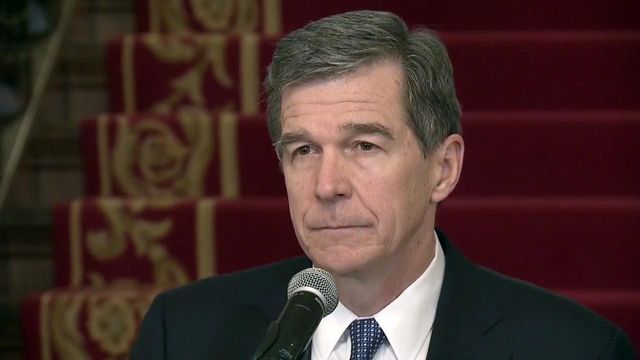Cooper, legislature spend big on private lawyers in fight over powers
The power struggle between Democratic Gov. Roy Cooper and the Republican legislature over political appointments has so far cost state taxpayers more than $1.5 million in legal fees from private lawyers.
Posted — UpdatedCooper has filed multiple lawsuits challenging the changes as politically motivated limits on his power as governor.
Spokespeople for House Speaker Tim Moore and Senate President Pro Tem Phil Berger did not return requests for comment Tuesday.
But Cooper spokesman Ford Porter said in a statement Tuesday afternoon that legal action was necessary to stop "unconstitutional laws and partisan power grabs" by legislative leaders.
"Since 2010, more than a dozen laws passed by the General Assembly have been overturned," Porter said. "If legislators would simply respect the courts and obey the state Constitution, these lawsuits would be unnecessary."
Although the state already employs full-time lawyers in the Attorney General's Office, separation of powers lawsuits often require outside counsel to represent competing government branches. In this case, the Attorney General's Office is neutral, representing the interests of the state as an entity but not taking the side of either lawmakers or the governor.
Last year's legal bills are part of a broader uptick in spending on private lawyers that began in 2011, rooted in distrust between new Republican legislative majorities and then-Attorney General Cooper. The administration of Republican Gov. Pat McCrory clashed with both the attorney general and, at times, his fellow conservatives in the legislature, and that trend has continued.
Andy Taylor, professor of political science at North Carolina State University, said both sides are hiring armies of lawyers to fight their legal battles, a move that's "totally unprecedented" in the state's history.
"This is the kind of stuff that historically has occurred in Washington," Taylor said.
"It seems like a lot, but litigation is expensive. Private law firms can do some pro bono work, but it is usually not for clients who can pay," Michael Gerhardt, a constitutional law professor at the University of North Carolina at Chapel Hill, said in an email. "Here, the client is a paying one."
Cooper's bills came primarily from two firms: Manatt, Phelps and Phelps, retained to help examine the options to expand Medicaid, and the North Carolina firm Brooks Pierce.
A handful of employees with Brooks Pierce, which worked on Cooper's separation of powers suit, donated a few thousand dollars to Republican candidates in 2016 and 2017. During that same period, lawyers with the firm donated at least $89,000 to Cooper, the state Democratic Party and other Democratic candidates, according to campaign finance records. Brooks Pierce partner Jim Phillips, who has represented the Governor's Office in the case, was one of Cooper's transition co-chairs.
In a statement, Porter said Brooks Pierce is one of the state's top law firms and employs lawyers of both political parties to work on state cases.
Gerhardt said it's not unusual for governors on both sides of the aisle to pick lawyers they trust – and it may be impractical to avoid the practice.
Even so, Gerhardt said, "'Is this how business is usually done in Raleigh?' is a fair question."
For their part, legislative leaders saw their own big legal bills in 2017. Records show outside law firms charged them more than $3 million in 2017 for a variety of cases, including voter ID and transgender bathroom access. About half of that total – $1.4 million – went to redistricting cases. Those figures are about on par with annual spending since 2015, when legal costs hit a record high at the General Assembly.
Gerhardt doesn't necessarily attribute that spike in legal fees to a growing political divide. Instead, he said, it may be more of a combination of already existing distrust and the lack of specific knowledge among the staff attorneys at the Attorney General's Office.
"Because the AG and the governor do not view gerrymandering and other laws enacted by the legislature in the same way the legislature does (and vice versa), the legislature’s leaders feel compelled to hire outside counsel to argue their viewpoints in court. At the same time, the legislature may seek to have cut the resources available to the governor and the AG to fully staff their respective offices," Gerhardt said. "And, if the governor and the AG do not believe that their full-time staff can adequately handle some matters in house, they end up reaching for outside counsel."
But as the legal battles continue, Taylor said they're likely to have much broader repercussions for gubernatorial and legislative power.
"It's not really about persuading public opinion and winning the hearts and minds of North Carolina residents," Taylor said. "It's about trying to weaken and undermine the institutional power base of the other side."
• Credits
Copyright 2024 by Capitol Broadcasting Company. All rights reserved. This material may not be published, broadcast, rewritten or redistributed.






